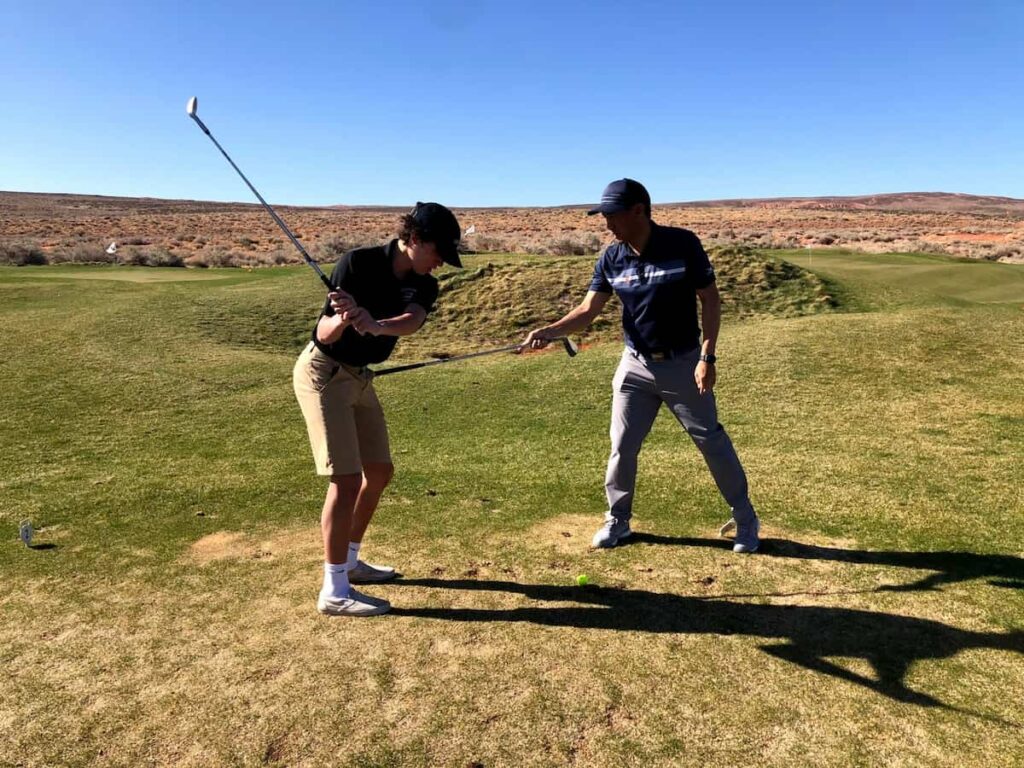Golf is often described as a sport that requires not only technical skill but also strategic thinking. While mastering the fundamentals of the golf swing is crucial, understanding how to apply those skills on the golf course is equally essential. This is where a playing lesson in golf comes into play. Playing lessons provide a real-world golfing experience, allowing you to apply the skills learned on the practice range to actual course conditions.
Every golf professional gives different playing lessons and students sometimes want to focus on specifics on their game. I can discuss all the topics you can learn from a playing lesson and help you understand the benefits of this unique approach to golf instruction.
What is a Playing Lesson?
A playing lesson in golf is a type of golf lesson that takes place on the golf course itself, as opposed to a driving range or practice facility. During a playing lesson, a professional golf instructor accompanies a student golfer onto the course to provide personalized guidance and instruction based on real-world scenarios. This approach allows golfers to apply their skills in a practical context, helping them improve their course management, decision-making, mental approach and overall game.
Who Can Benefit from Playing Lessons?
Playing lessons are valuable for golfers of all skill levels, from beginners to advanced players. Here are a few scenarios where a playing lesson can be particularly beneficial:
- Beginners: New golfers can learn the rules of the game, etiquette, and basic course management skills in a real-world setting. Beginner players who request a playing lesson are typically quite serious about wanting to play golf in a quick manner.
- Intermediate Golfers: Players looking to break through plateaus in their game can benefit from refining their strategic decision-making and course management skills. These are students that are happy with their instruction from the practice areas but are having trouble showing on the golf course. Many of them are just trying to improve their game during golf leagues, local tournaments, or weekly matches with their buddies..
- Advanced Golfers: Even single-digit handicappers or scratch golfers can find value in playing lessons by fine-tuning their game, working on specific shot selection, or preparing for competitive play. For the golfer with a more advanced swing, I spend more time on the mental aspect of the game. I see how they think in certain situations and we discuss what’s preventing them from breaking through and give them other ways to prepare or visualize shots.
What are the benefits of taking playing lessons?
There are many benefits to taking playing lessons. Some of the key benefits include:
- Improved swing mechanics
- Better course management skills
- Smarter decisions in the short game
- Lower scores
- More enjoyment of the game
If you are serious about improving your golf game, I highly recommend taking playing lessons. A good instructor can help you identify your weaknesses and develop a plan to improve. As the student however, you should have a game plan of what you want to focus on since there is a broad area of the game and you most likely will be paying a good amount for the golf professional’s time.
What to Expect During a Playing Lesson
A playing lesson typically includes the following elements:
Course Management
Learn how to assess a golf course strategically. Your golf instructor will guide you in making informed decisions about shot selection, risk management, and navigating various course challenges such as pin placement and wind.
Putting Strategy
This is a critical part of a playing lesson. Your instructor will teach you how to read greens, how to control your putting stroke and distance, visualize your putts beforehand and also trickier shots like if your ball is sitting against the fringe.
Shot Selection
Golfers will learn how to choose the right club and shot type for various situations, such as approach shots, tee shots, and recovery shots. Many other factors also come in play when choosing your club like elevation, ball lying in different conditions and wind speed.
Your Golf Swing
While a good portion of a playing lesson will be on strategy and decision-making on a golf course, your instructor will also provide you reminders and suggestions on your swing, likely harkening back on tips from previous lessons. Many of my students and golfers all over the world will indirectly change their swing because of the pressure on the course which can also change their swing tempo.
Strategy and Mental Game
Mental strategies, like staying focused, managing frustration, and maintaining a positive attitude during the round. This is an overlooked component of your golf game.
Tournament Preparation
If you participate in golf tournaments or competitions, playing lessons can prepare you for the challenges of tournament play. You’ll learn to handle high-pressure situations and make strategic decisions that can give you a competitive edge.
Improved Course Etiquette
Playing lessons often include instruction on proper golf course etiquette, ensuring you conduct yourself respectfully and considerately during your rounds. Even taking care of the course better should be addressed if the golf professional notices how you replace divots or fix a ball mark on the greens. I personally like my students to respect the course and course staff at all times.
Real-World Examples of Playing Lessons
To better understand the benefits of playing lessons, consider these real-world examples:
Navigating a Challenging Hole
If a golfer consistently struggles with a particular hole, a playing lesson can help them develop a strategy and shot selection tailored to that specific hole’s challenges. Say you are about to hit an approach shot 180 yards out but there is water in front of the hole. Do you go for it or lay up? Should you hit your 190 club to be safe? There are so many factors to consider here, from your shot distance, to the angle and size of the green, to how high or low your typical golf shot is. This can lead to a more positive attitude when approaching difficult situations which can lead to a more consistent and better swing.
Course & Risk Management
An instructor can help a golfer learn when to take risks and when to play conservatively based on their skill level and the situation. Your next shot can easily depend on your situation, especially in match play. Do you need to be aggressive on this shot? Did you prepare properly for the course you’re playing on? How will external factors like wind affect your irons?
Mental Toughness
Playing lessons can also focus on developing mental toughness by simulating high-pressure scenarios, such as crucial putts or tee shots. Positive thoughts will lead to visuals with better performances. All great golfers focus on how to get the ball where they want it to go, not where they don’t.
Frequently Asked Questions about Playing Lessons
How long does a playing lesson typically last?
Playing lessons can vary in duration but often last between 9 and 18 holes, depending on the golfer’s goals and the instructor’s recommendations and the instruction fees. They can sometimes take longer than your typical pace since we will be discussing strategy between shots and there are times where I want my students to hit extra shots. I have my playing lessons at the end of the day taking the last tee time so no one rushes us.
When should I take a playing lesson?
I get frequently asked to give a playing lesson to a new student (beginner/intermediate level) at the beginning. I tell them to wait to do one at the end of a series of lessons so we can improve on their swing and short game first. The playing lesson is for them to learn how to apply their improved game to the golf course. For better players, they usually ask for a specific topic or usually course management.
Can I use a playing lesson to prepare for a tournament?
Absolutely, many competitive golfers use playing lessons to prepare for tournaments and gain a competitive edge.
How are playing lessons priced?
This is the kicker for playing lessons. Most golf professionals charge their hourly rate because you are still taking up their time just as you would on the practice areas. They could be $100/hour so a 9-hole playing lesson would be $200. Sometimes, they could offer a 3-hole lesson as well for an hour. Every instructor is different but if you are a continual student with your instructor, just ask him/her. Sometimes, they can give you different cost options.
Conclusion
A playing lesson in golf offers a unique and highly effective way to improve your golf game and lower your scores. By taking the skills learned on the practice range and applying them in a real-world context, golfers can enhance their course management, decision-making, and overall performance.
Whether you’re a beginner looking to build a strong foundation or an experienced golfer seeking to fine-tune your skills, a playing lesson can provide valuable insights and help you become a more confident and successful golfer on the course. Try and be specific and have a gameplan on what you need to work on with your golf instructor as well.


